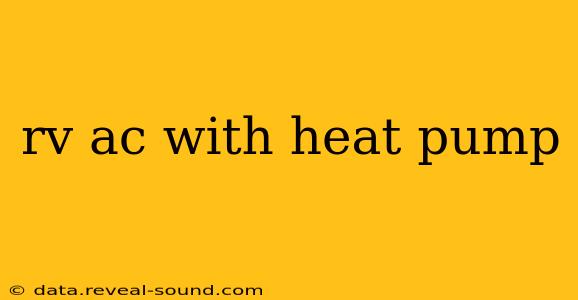For many RVers, the dream of hitting the open road is intertwined with the comfort of reliable climate control. An RV air conditioner with a heat pump offers the ultimate solution, providing both cooling in the summer and efficient heating in the winter. But how does it work, and is it the right choice for your RV lifestyle? This comprehensive guide delves into the intricacies of RV AC units with heat pumps, addressing your key concerns and helping you make an informed decision.
What is an RV AC Unit with a Heat Pump?
Unlike traditional RV air conditioners that only cool, a unit with a heat pump utilizes a reversible refrigeration cycle. This means the same system that cools your RV in summer can also extract heat from the outside air and pump it inside to provide warmth during colder months. This offers significant advantages over traditional electric or propane heaters, often resulting in lower operating costs and increased energy efficiency.
How Does an RV Heat Pump AC Work?
The heart of a heat pump system is the refrigerant. When cooling, the refrigerant absorbs heat from inside the RV and releases it outside. When heating, the process reverses: the refrigerant absorbs heat from the outside air, even in relatively cold temperatures, and releases it inside your RV. This heat transfer is made possible by the varying pressure and temperature of the refrigerant within a closed system. This is far more efficient than traditional electric resistance heating, which simply converts electricity into heat.
Is a Heat Pump AC Worth the Investment?
The decision to invest in an RV AC unit with a heat pump depends on several factors: your typical travel climate, your budget, and your priorities. If you frequently camp in moderate climates where you need both heating and cooling, a heat pump can offer considerable cost savings in the long run compared to running separate heating and cooling systems.
What are the Advantages of an RV Heat Pump AC?
- Energy Efficiency: Heat pumps are significantly more energy-efficient than resistive electric heaters, using less electricity to produce the same amount of heat. This translates to lower operating costs and a smaller impact on your RV's battery system.
- Dual Functionality: One system handles both heating and cooling, simplifying installation and maintenance while saving space.
- Quiet Operation: Compared to propane furnaces, heat pumps tend to operate more quietly.
- Environmentally Friendly: Because they use less energy, heat pumps often have a smaller carbon footprint compared to other heating methods.
What are the Disadvantages of an RV Heat Pump AC?
- Cost: Heat pump systems typically have a higher initial purchase price compared to standard AC units.
- Cold Climate Performance: While improved, heat pump efficiency decreases as outside temperatures drop significantly. In extremely cold conditions, a heat pump may struggle to provide adequate heating, potentially requiring supplementary heating sources.
- Installation: Proper installation is crucial for optimal performance. Improper installation can lead to reduced efficiency or system failure.
How Efficient are RV Heat Pump ACs Compared to Other Heating Systems?
The efficiency of an RV heat pump AC is measured by its Coefficient of Performance (COP). This compares the amount of heat produced to the amount of electricity consumed. A higher COP indicates greater efficiency. Generally, heat pumps have a much higher COP than resistive electric heaters, making them significantly more economical for heating. However, their efficiency decreases in extremely cold temperatures, where propane heaters might become more practical.
What Size RV AC with Heat Pump Do I Need?
The appropriate size of your RV AC unit with a heat pump depends on the size of your RV and the climate you'll be traveling in. Consult the manufacturer's guidelines and consider factors such as the number of windows, insulation levels, and your desired temperature. Oversizing or undersizing can both lead to inefficiency and discomfort.
How Much Does an RV AC with Heat Pump Cost?
The cost of an RV AC unit with a heat pump varies depending on the brand, model, size, and features. You can expect to pay significantly more than a standard AC unit, but the long-term savings in energy costs can offset this initial investment, especially with frequent use. Remember to factor in professional installation costs.
Can I Install an RV Heat Pump AC Myself?
While some DIY enthusiasts attempt self-installation, it's highly recommended to have a professional install your RV AC unit with a heat pump. Incorrect installation can lead to performance issues, safety hazards, and void the warranty. Professional installation ensures optimal performance and peace of mind.
This detailed guide provides a solid foundation for understanding RV air conditioners with heat pumps. Weighing the advantages and disadvantages, and considering your specific needs and budget, will help you determine if this advanced climate control system is the right choice for your RV adventures. Remember to consult with reputable RV specialists for personalized recommendations.
